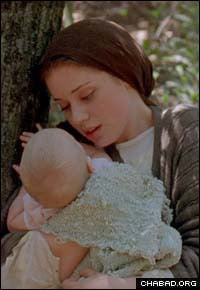As the tops of moon-illuminated palm trees blended with the bright camera lights to cast the typical glow of a Hollywood movie premiere on the streets outside, the stars of "A Light for Greytowers" and their guests sauntered across the red carpet and into the Sherry Lansing Theater on Paramount Studio's lot. But this was no typical premiere: Those who filled the 280 seats inside were all women and were all dressed in keeping with Jewish strictures on modesty.
Almost everything about the movie challenges accepted notions about Hollywood these days. And while the film was produced and directed by an industry professional – Robin Garbose's other credits includes a string of off-Broadway plays and performances at the Juilliard School of Drama, and the "Head of the Class" and "America's Most Wanted" television shows – one key element of its expected distribution runs fully against the grain of the entertainment business: A full half of all Americans will never see the movie, because Garbose, citing provisions in Jewish law that prevent women from singing in front of men, is limiting the musical's run to all-female audiences.
The film's young actresses won't have it any other way. Nearly all of whom are alumni of the Kol Neshama Performing Arts Conservatory in Los Angeles, which Garbose created eight years ago to provide professional artistic training and performance opportunities for Jewish girls in a Torah-observant setting.
Bracha Leeds, co-director of the Chabad Jewish Student Center at the University of California at Berkeley, was hired as choreographer for the film and ended up filling an opening in the cast.
"I never thought there would be a place for this in my life when I became religious," said Leeds, who embraced observant Judaism while a student at Berkeley. Before that, she was a professional singer and actress, spending days a week at Paramount rehearsing for live stage shows.
Referencing teachings of the Rebbe, Rabbi Menachem Mendel Schneerson, of righteous memory, that one should use his or her talents for holiness, Leeds pointed out that Garbose's work meant that her skills "didn't have to go to waste."
She added that she's now planning on bringing the film to Berkeley.
Light and Darkness

The movie is based on a novel by the same name and bears approbations from Rabbi Yoel Bursztyn of the Bais Yaakov girls high school in Los Angeles and Rebbetzin Baila Stern of the Bais Yaakov girls high school in Passaic, N.J. It was shot four years ago on location at the Rohr Jewish Student Center, a state-protected Victorian-style home and Chabad House at the University of Southern California.
At the Dec. 29 premiere, members of the Los Angeles Jewish community lined up at kosher food carts offering hot peanuts, popcorn and pretzels. Inside, an expansive screen played the HD formatted movie.
Outside the theater, songwriter and musician Levi Yitzhaq Garbose manned the tables and greeted guests. Although he co-wrote and produced the film with his wife, he was unable to enter the theater; but he waited in what he described was "the perfect night" for a show.
Turning to the movie, Garbose – who was drawn to Chabad 36 years ago after searching out a Jewish world described in the stories of Isaac Bashevis Singer and finding it in the Crown Heights section of Brooklyn, N.Y. – commented on its message.
"Just as the light of the Baal Shem Tov should permeate the world," he said, referring to the founder of Chasidic thought, "the film's plot of goodness and kindness [will] permeate the world."
Like her husband, Robin Garbose said that she drew inspiration from Chabad teachings and the lifelong dedication to Jewish education exhibited by the Rebbe, Rabbi Menachem Mendel Schneerson, of righteous memory. One of her recent productions was "Roots," a musical play based on the memoirs of the Rebbe's father-in-law, the Sixth Lubavitch Rebbe, Rabbi Yosef Yitzchak Schneersohn, of righteous memory.
"I want to light up the world through the medium of light and darkness, which is images," she related. "Movies have the potential of being a [redemptive] vehicle if they're [made by] the right hands."
After watching the film, actress Esther Perel Marks said that "Hollywood is usually not associated with holy things. Through this film, we are making it holywood."






Join the Discussion